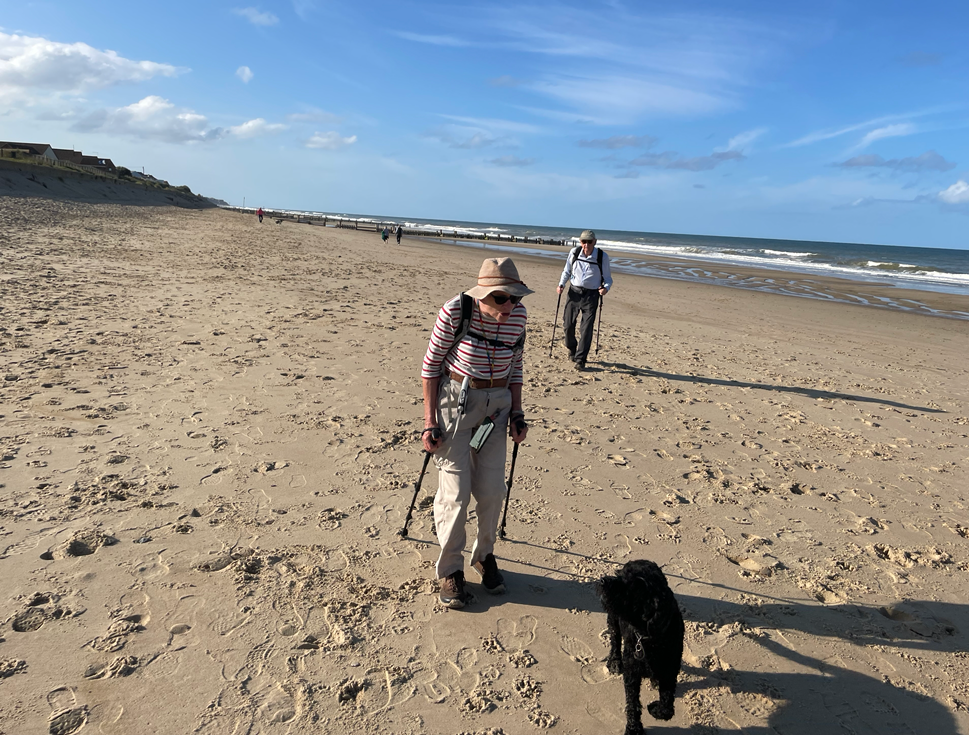Norfolk’s coastal path has to be one of the great triumphs of nature in the UK. We walked along with the sea churning for six glorious miles today.
What is astonishing is that these wondrous beaches are more or less deserted. Miles of glorious sand – and litter-free- and rolling waves. Why don’t holidaymakers follow the advice of the eighteenth-century Doge of Venice, who once wrote, “Why should I travel when I have already arrived!”
We pass the submerged Eccles village. We were told that passersby occasionally hear the church bell of the old St Mary’s tolling dolefully. Once, after a storm that raged across the churchyard, a horrified passerby saw skeletons standing erect with polished skulls staring out at the sea. I hope that’s true!
We saw a small seal cub inching his (or her, how can you tell?) way to the sea.

Sweeties for Everyone
A few days ago, we were with a delightful lady who kept calling me “sweetie”! You read it right, not sweaty! Which would have been accurate. I was quietly pleased, for such endearments don’t come my way too often these days. Then I heard her calling her dog sweetie as well, so my old heart simply drooped. I recall the great Richard Attenborough was said to call everyone “darling”; he did this, we are told, on good authority, because he could’ve remembered anyone’s name, and so it saved time.
Front Page Folly
I recall reading some years ago in the Times Letter’s columns:
“There isn’t a picture of Princess Diana on your front page today. Is she ill?” The same thing is happening to Princess Kate, and there she is today, all over the front page with a bruised finger!
I sometimes want a break.
End Game
Prime Minister Balfour once said, “Nothing matters very much, and most things don’t matter at all.” ZANE supporters know my commentaries concentrate on politics, money, sex, religion and death. In my view, everything else is small talk.
And, so to death… None of us is going to get out of this life alive, and at this late stage it’s time to get serious! If not now, when?
I spend a good deal of time – as doubtless, dear reader, do you – at funerals and the memorial services of my friends and relatives. It’s so easy to get hardened to the miseries of life. I recall the late actor David Niven saying, “Life is such a sod, you have to laugh or you will be crushed”.
What else can we do but try to get on with our own little lives as best we can?
But however often we attend the services of those close to us, however stiff we pretend our lips may be and whether we have a faith to sustain us or not, death remains a profound shock. The late Queen Elizabeth said, “Grief is the price we pay for love.” When the scenery on the little stages on which we jig and prattle away suddenly vanishes, just how are we meant to react? Please don’t say, “You will of course, get over it”, for grief’s not a common cold.
How long does it take to get used to the gaps in our new stage set? How do we dredge up the courage to continue the dance? Now the light of our life has been extinguished, who’s going to bother to talk to us with any real interest? Who’s going to care when we face extreme old age? Who do we shop or dress for now? And although we may be able to find someone else to do something with, will we ever be able to find someone to just do nothing with? Can we ever rekindle the fires of love and mutual interest that have been extinguished, so only grey ash remains? Does it matter if we live or die?
Deathmin
The shock of death is partly the speed with which the rest of the world spins by without missing a roll. How do we face the gloomy clutter of dying without complaint? (Incidentally, I have a file marked “Deathmin”, and respectfully suggest you might do the same). Then comes the reading of the will for, of course, where there’s a will, there’s always a relative.
Gloomy old man that I am, I raised the issue of planning for death the other day with four close friends who all happen to be vicars. We discussed the details of the end game. We all know that death makes money with many firms competing for the business.
“Tell me,” I started. “As professionals, do you really care whether you are buried or cremated, and why do you care? Would you prefer to be shunted down the aisle by half a dozen bored, retired policemen wanting a smoke, or do you plan that family members will do the lifting?
“And do you need a fancy coffin with mock brass handles, or will a cheap pine job – or cardboard – do?
“Do you need a hearse with someone wearing a frilled top hat prancing around – and the next day waiving a hefty invoice – or would you prefer a simple service and then to be buried at sea? Or how about a quiet service in a country church and to be laid to rest among the grey, slanted graves?
“Have you written your funeral wishes (please don’t include Sinatra’s “My Way”) or, as you will be pushing clouds, will you leave that for others to deal with? Will a family member read the eulogy or will that be the vicar’s job?
“Do you mind being forgotten?”
One said that crematoria were dumbed down to such a degree – probably so as not to offend people of any faith, or of none – that they reminded him of a dentist’s waiting room. Another said the fire part made him think of the Nazi gas chambers and he hated the idea of being ground to ashes. Nor did it help that it’s usually raining at crematorium services. And he didn’t much like the strict time rules, either – 30 minutes then, “Next!”
When Time is Over
The anguish of death is summed up by American poet Emily Dickinson in her poem “XXXIX”:
“I shall know why, when time is over,
And I have ceased to wonder why;
Christ will explain each separate anguish
In the fair schoolroom of the sky.
He will tell me what Peter promised,
And I, for wonder at his woe,
I shall forget the drop of anguish
That scalds me now, that scalds me now.”

